
Are you struggling to find engaging topics and unique ideas for your school’s content marketing efforts? Sourcing original content that will draw in prospective students can be a challenge. Not only do you want the information conveyed to be informative, you want it to be captivating, on-brand, and to add value to a prospective student’s interaction with your school online.
With that in mind, have you considered using interviews as a means of generating content? Interviewing is a powerful tool that provides timely, authentic, and relevant information straight from the individuals that prospective students want to hear from the most.
From notable alumni to current students and instructors and even support staff, schools have a diverse cast of potentially interesting interview subjects just waiting to tell their stories. Read on to learn how you can tap into this hidden wealth of content resources.
How Can Interview Content Enhance Your Student Recruitment Efforts?
When you are looking to develop new content strategies for higher education marketing, the student enrolment journey should be at the forefront of your thinking. From the moment a prospective student discovers your school for the first time to when they begin your program, you need to consider what information that student needs and who is best to hear it from. Conducting interviews is a simple way to create unique content that stands out from the noise and allows you to not only deliver the right information, but deliver it from the most trustworthy sources.
Aside from the authenticity and relevancy that interview-based content provides, conducting just one interview can provide your school with useful content that can be repurposed in the future across different digital channels. For schools that may be strapped for resources when it comes to digital marketing and content generation efforts, this can be a real bonus. In addition, by interviewing the right people, you can take advantage of their network, as interviewees will hopefully share and amplify the interview-based content your school creates.
Ideal Candidates for Higher Education Content Marketing Interviews
Choosing the right person to interview is important, and will largely depend on what type of content you’re planning to produce and what information you want to provide the reader. Fortunately, although you may not realize it yet, several potential candidates are walking your school’s halls at this very moment.
Invite Faculty and Support Staff to Share Their Knowledge
Your school’s faculty and support staff, for instance, can make great interviewees. From admissions to student services, each department has knowledge that could be valuable to prospective students reading your content. Teachers, instructors, and tutors are also great sources of information, and interview content featuring them will help prospective students put names to faces and learn about their potential future advisors. Let’s take a look at how a healthcare college in Ontario used both its staff and instructor’s expertise to its advantage.
Example: Saint Elizabeth Health Career College uses its faculty members’ knowledge to create interesting blog content. In this example, both an instructor and admissions officer were interviewed to speak about why Health Care Assistant training is a great fit for mature prospective students. Reading information that comes directly from reliable interviewees helps reinforce trust between the reader and the school.

Current Students Provide Insight into Life on Campus
While support staff and faculty are extremely valuable for interview content creation, don’t forget your current students. Nothing is more authentic than hearing from students themselves, and a well-chosen interview with someone who has had first-hand experience of what life is like at your school can really add weight and credibility to your key messaging.
Interviewing current students can be particularly helpful when it comes to international recruitment. Hearing from students who share their culture and background, who presumably had similar concerns and needs before enrolling, and who are now flourishing, will only reinforce your school’s strengths as an international study destination. For inspiration, let’s look to a college in British Columbia that reaches out to international applicants using interview content.
Example: Langara College features a Q&A interview with one of the school’s first year international students in the news section of its website.
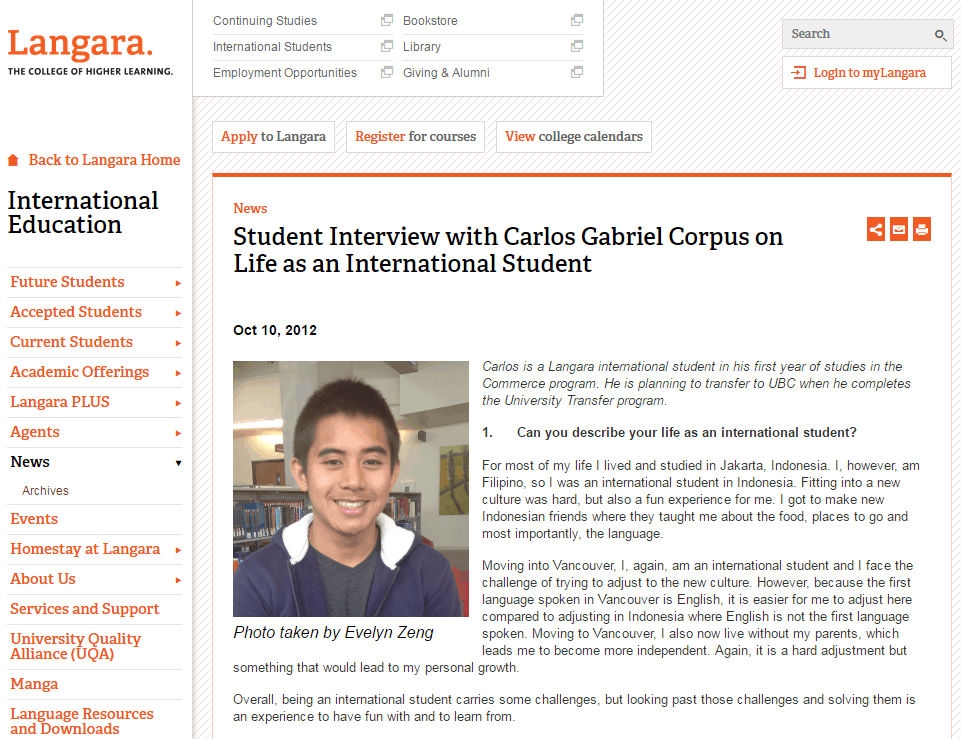
Notable Interviewees that Prospective Students Will Admire
Interviews with current students and staff are easy to set up, serve a clear and useful purpose, and align perfectly with the motivations of your targeted personas. Nonetheless, in some situations, you may want to look further afield for candidates that will really add something fresh and exciting to your content marketing mix.
You want someone who is passionate and has an interesting story that makes them unique and inspirational. In addition, you might also want to consider interviewing an individual who has a significant social media presence. A strong social media following that aligns with the demographic characteristics of your student personas can help your content go that much further. If the interviewee shares your content, it has the potential to gain more likes, comments, shares, and be seen by more prospective students.
By selecting the right interviewee with a great story and sizable social following, you can reap many of the same benefits that influencer marketing offers. While this strategy isn’t influencer marketing per se, it is grounded in the same principle that you can use an influential individual’s experience and following to improve awareness of your brand.
Example: The University of California, Santa Cruz’s Creative Writing department features a variety of alumni interviews with graduates who have gone on to become notable writers and authors. Martha Mendoza is a prize-winning writer with a substantial social media following.
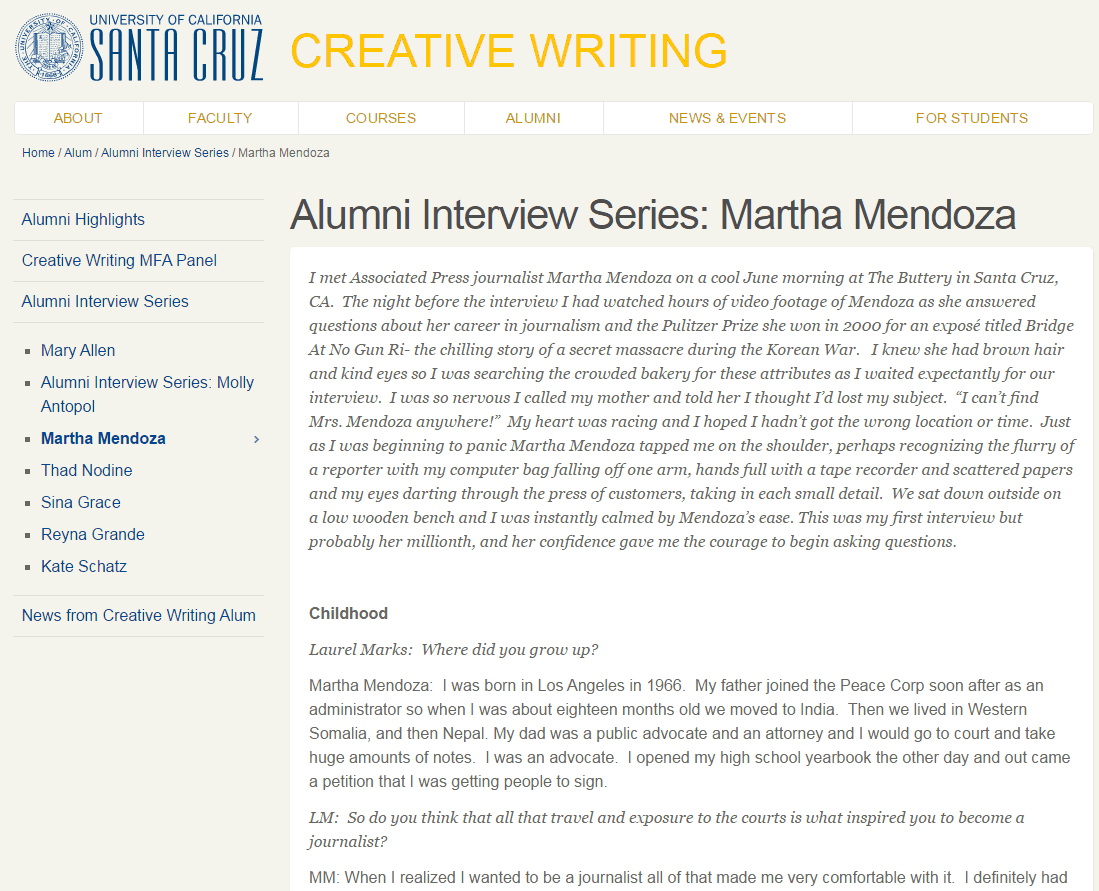

The interviewee’s social media following may come in handy as the school distributes its content. In addition, it also demonstrates to prospective students the success of others who have studied at the school.
Alumni Provide Proof of Student Success
Even if they are not that well-known, alumni who have gone on to make great achievements like opening a business, starting a charity, or conducting important research also make fantastic interview subjects. The stories and points of view that your alumni have will provide prospective students a valuable insight into their potential future success if they attend your school.
Keep in mind that being featured in an article can also be a great opportunity for interviewees. Try to include a short bio of the interviewee at the beginning of the article, as well as a quality photograph. Not only is this respectful, but it also serves as an incentive for desirable individuals—like the interviewee in this next example—to get involved and participate in an interview.
Example: Rhodes Wellness College features a notable graduate who has gone on to open his own business as a counsellor and human potential coach since his program finished. The blog is a valuable opportunity for both parties, as the interviewee gets the chance to promote his business and the school gets a great blog post that prospective students will find relevant and trustworthy.
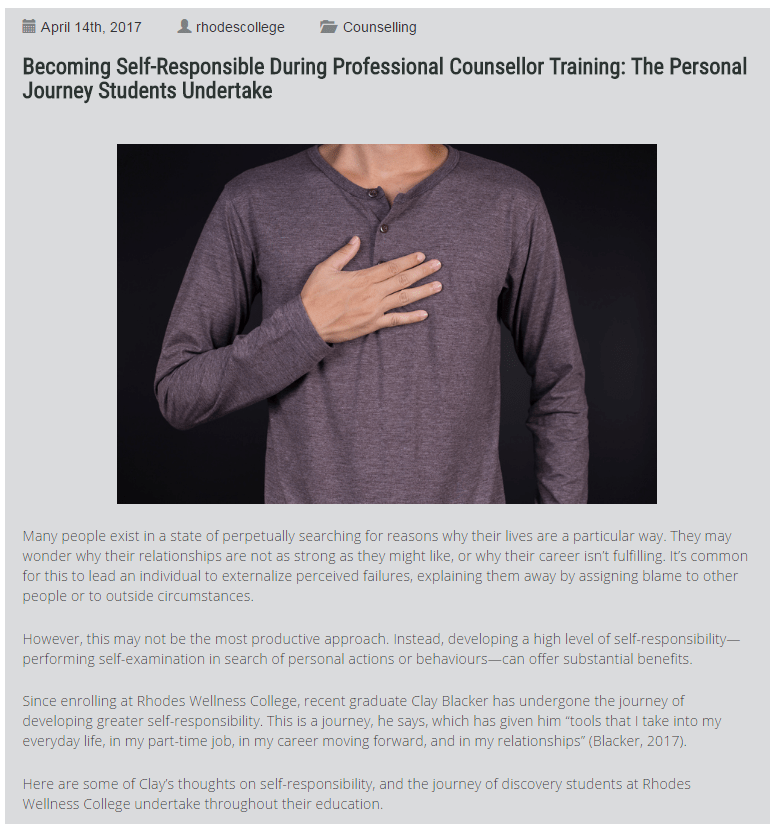
Before an Interview: How Higher Education Marketers Should Prepare
When it comes time to set up an interview, you have several options in terms of format and style. Depending on the amount of time you have and the willingness of your interviewee, you can conduct your interview either in-person, over the phone, or by email. While in-person interviews are fantastic for receiving quality responses, it can be challenging to arrange meetings that work for all parties involved. Telephone interviews can be a great compromise. The interviews happen in real time, so you can ask follow-up questions, but require less of a time commitment and are easier to schedule.
Email interviews are also a decent option if your interviewee is too busy for a phone call, but they leave very little room to elaborate or go ‘off-script’ with interviewees, so they can come across as a bit static and rehearsed. However, they also give interviewees more of a chance to consider their answers, so they can generate some extremely quotable and high-quality material.
Once you decide how you’re going to conduct the interview, consider whether you want it to be unstructured or structured. Unstructured interviews require little preparation. The conversation happens naturally, and you don’t write any questions in advance. In these interviews, the interviewee is more likely to guide the direction of the interview. Structured interviews consist of writing questions in advance, though there is still room for asking follow-up questions or elaborating. Many interviewees will appreciate a structured format and seeing the questions in advance, because it gives them the chance to collect their thoughts and prepare.
Using Interviews in Blog Posts to Create Insightful Content
Your school’s blog can be an excellent medium for delivering enriching long-form interview content. Blogs offer a bit more flexibility than some other channels with how you can present interviews, allowing you to delve deeper and provide insightful content.
For instance, when creating blogs which focus on aspects of a particular program, using interviews with teachers and faculty members helps demonstrate your school’s expertise on the subject, helping to pique prospective students’ interest and entice them to convert. Featuring support staff in your school’s blogs can also help prospective students to become familiar with the services available on campus.
Example: Booth University College’s Student Blog features a Q&A style interview with the college’s Student Services Coordinator. The interview was conducted and written by a current student at the college.

Interviews with your school’s staff are just one creative way to provide prospective students a peak into life on campus. You can also use interviews with current students and alumni to create ‘a day in the life’-style blogs, profile pieces, or other posts which celebrate the diversity, personalities, and achievements of your wider school community. These types of blogs help prospective students visualize being on their own path to success at your university.
No matter who you choose to interview, don’t forget the essentials of a well-rounded higher education content strategy: including relevant keywords in the title, H2s, and body text of your posts, as well as a call-to-action at the end of your blog to maximize its potential effectiveness.
Strategies for Distributing Interview Content Across Your Digital Channels
One of the reasons interviews are such a powerful tool for schools is that you can use them in a multitude of ways on a variety of digital channels, including your school’s social media accounts, website, and email campaigns. While you want to make sure you don’t flood all your channels with the same content, a carefully timed and well-executed content distribution strategy can help you gain continued value from a single interview long after it has been conducted.
Example: As part of its content distribution strategy, Rhodes Wellness College shares a recent blog post that features an interview with one of its instructors on its Facebook page.
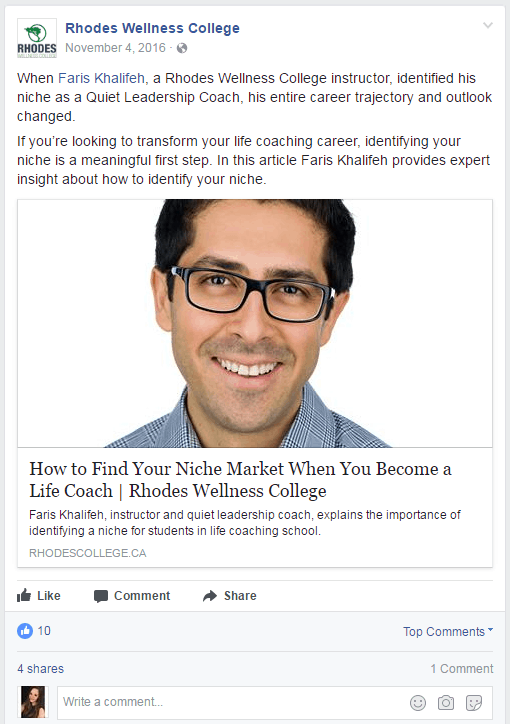
There are countless innovative ways you can repurpose interview content throughout your school’s website. You can feature quotes and links to interview content on your home page, program pages, and testimonials sections, or anywhere else on your site that prospective students are likely to land on. As demonstrated in our next example, if you’re looking to target a particular type of applicant with your content, it is best to strategically place the content in key areas of your website.
Example: The University of Kent distributes interview content where targeted students are more likely to frequent by featuring interviews with current international students on the international recruitment section of its website. To provide a more personalized user experience, visitors to the web page can select which region they want to read student testimonials from.
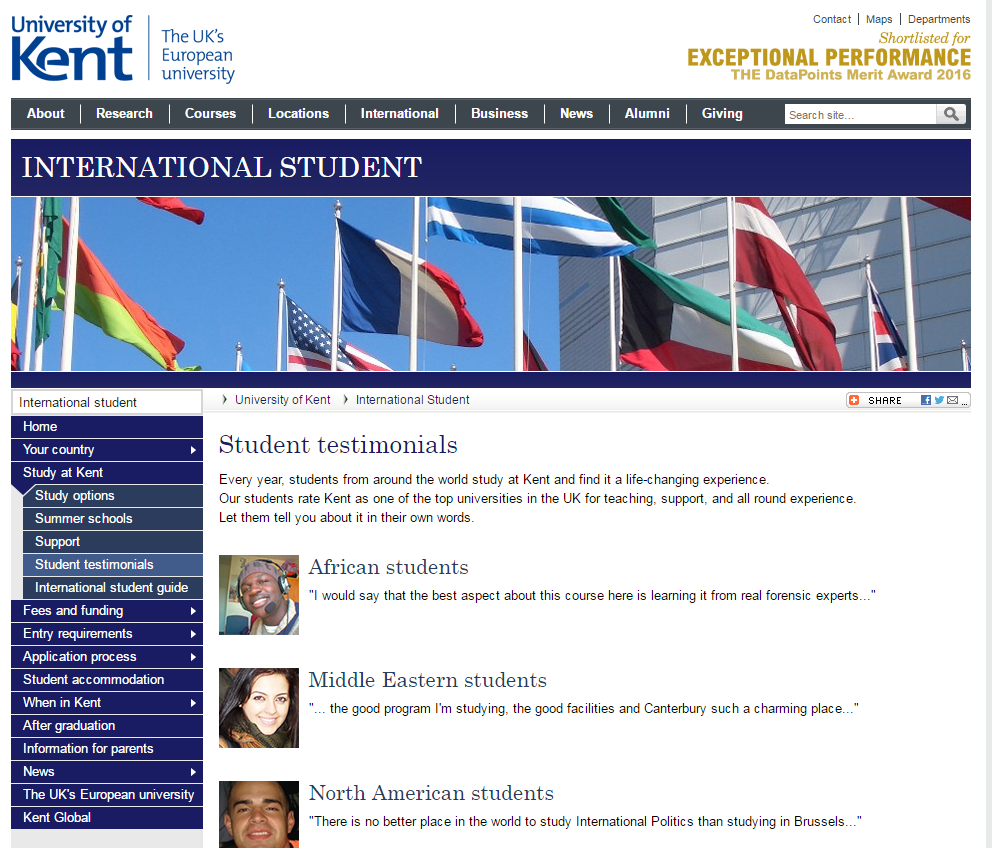

Moving away from your website for a moment, a small quote from current students and alumni can make an excellent addition to an email nurturing campaign. Hearing directly from your current and past student body helps build a prospective student’s trust in your school’s brand and can nurture them through the funnel.
Your school’s social media channels are another great platform for distributing interview content. Not only is content on social media extremely shareable, the flexible delivery options of social platforms allow you to share content in text, photo, or video format. For particularly high-profile or notable interviews, you might even want to consider using Facebook Live or Instagram live videos to host interviews in real-time. The university in our next example demonstrates how powerful a social media campaign with the right hashtag can be.
Example: Using the hashtag #SweetHomeUChicago, the University of Chicago’s Admissions Instagram account features an interview series focused on student experiences. This format presents a unique opportunity for prospective applicants to peak into the lives of current students from all over the world attending U of C.

Additional Interview Tips for Higher Education Content Marketing Specialists
You’re almost ready to write interview-based content for your school. Before you get down to it, below are some tips we have collected here at HEM that have helped us in creating interview-based content that truly stands out:
- Research your interviewee in advance on platforms like LinkedIn so you can ask targeted, relevant, and thought-provoking questions
- Always ask an interviewee in advance if they are okay with being recorded for transcript purposes
- Make the interviewee comfortable, you may not realize that some subjects are nervous when you interview them
- Explain the purpose of the content and who the audience is, so the interviewee can tailor their answers to your questions
- Keep your student personas in mind when asking questions, focus on what is going to be interesting to the prospective student
- Use open-ended questions and ask follow-up questions, don’t be afraid to ask your interviewee to elaborate or provide an example
- Always end the interview by asking if there’s anything else that they want to add about the subject
Interview-based content reaches out and speaks directly to prospective students. It demonstrates your school’s knowledge and the resources you offer to prospective students, and gives them a perspective of your school that they really trust. Not only that, but it is an ideal way to diversify your school’s higher education content marketing strategy, helping you to create a variety of high-quality content for your school’s digital channels for years to come.






